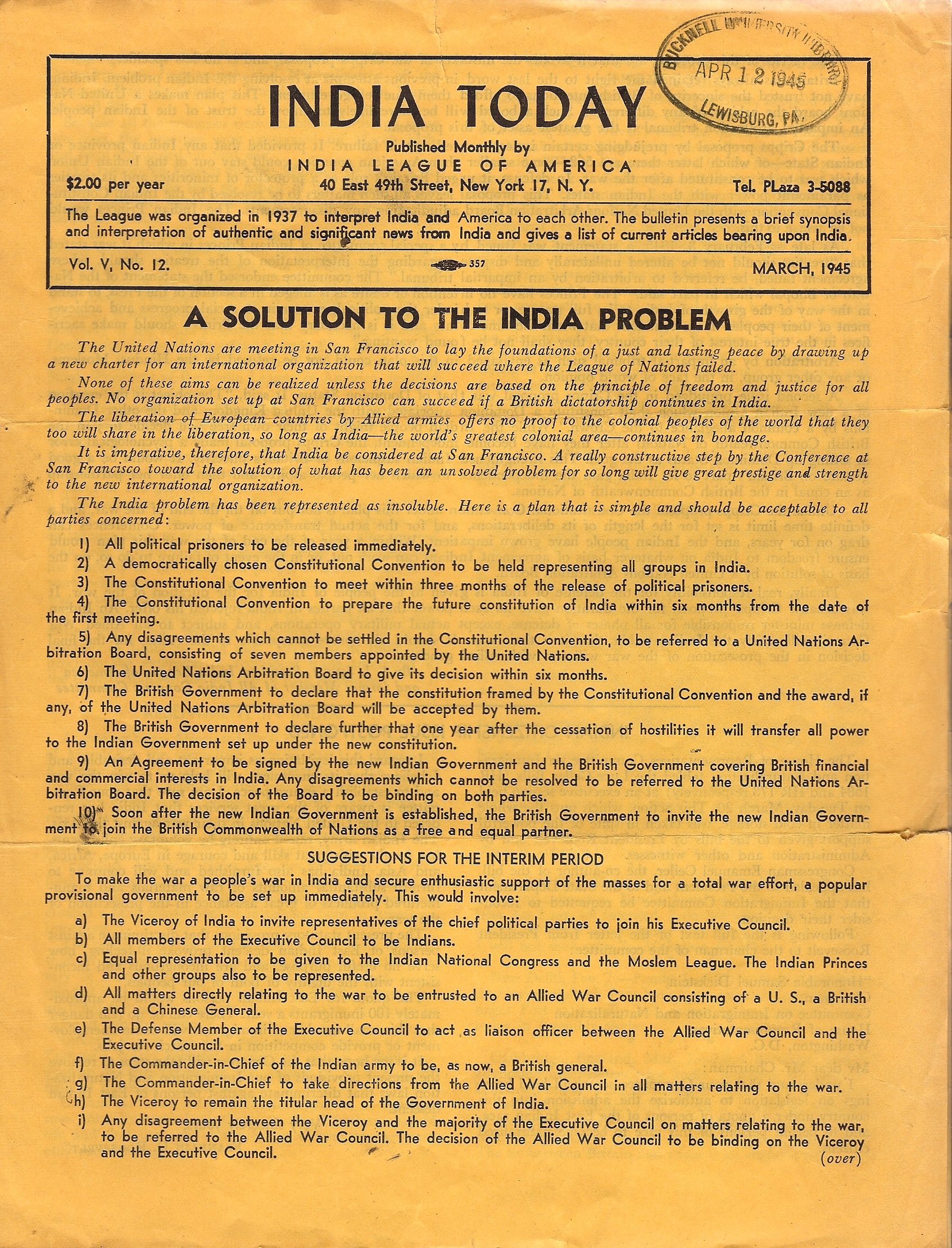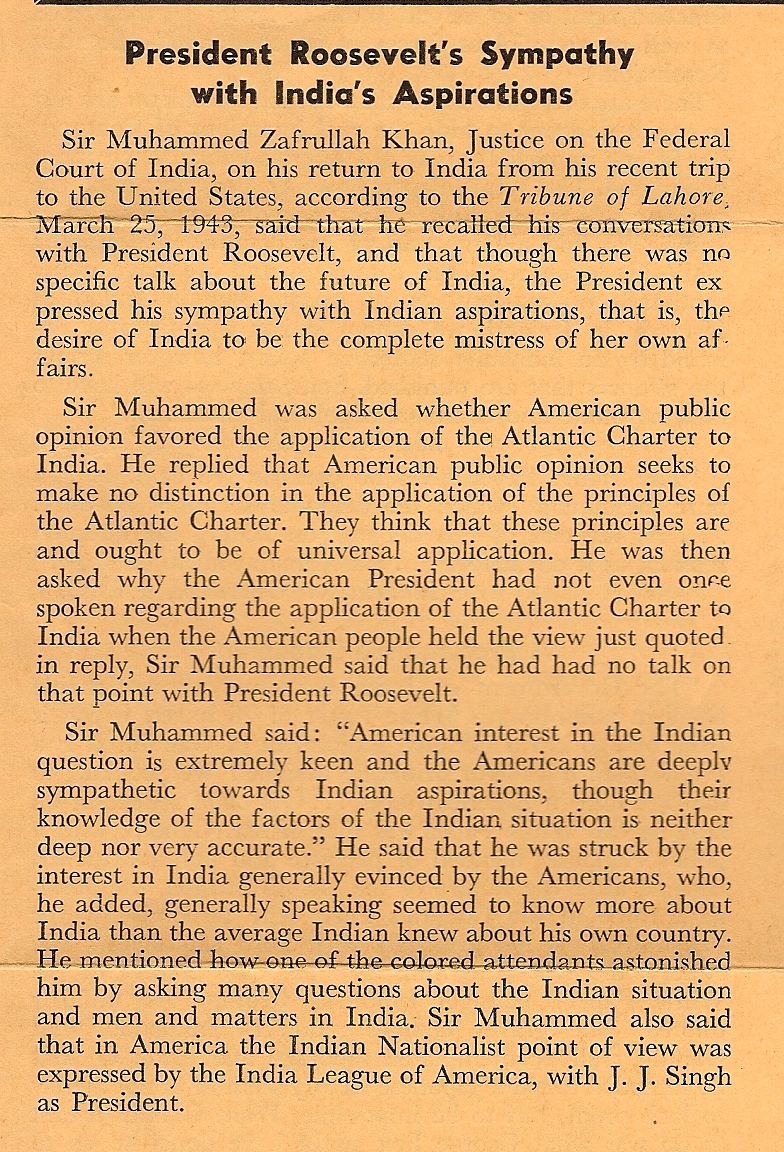“A Solution to the India Problem”
Category Archives: Primary Sources
Reply
Vol. 4, No. 5, August 1943
“Louis Fischer’s Writings Banned in India”
- The Home Member of the Government of India, Sir Reginald Maxwell, initiated the ban because Fischer’s writings were “prejudicial to the cause of the United Nations.”
- “The truth of the matter is that Mr. Fischer has incurred the displeasure of His Majesty’s Government in India by exposing the real reasons for the failure of the Cripps Mission, and by suggesting since his return to this country that the Indian deadlock could be broken if only Churchill would meet India half way.”
Vol. 4, No. 4, July 1943
“President Roosevelt’s Sympathy with India’s Aspirations”
“Over the Radio”
- Quotes from a WHN radio, round table discussion on “Should the United Nations Enter the India Situation?”. Participants included J.J. Singh, George Sokolsky (New York Sun), George H. Combes, Father Kiernana
- Singh replied that yes, the UN should become involved in the Indian situation, but then goes on to explain how it is in American interests to enter the India situation for both ideological reasons: taking “an interest in the destiny of four hundred million citizens of the world” and practical reasons: “thousands of American boys are today in India.”
Vol. 4, No. 3, June 1943
“Louis Fischer’s Open Letter to Winston Churchill”
“As We See It”
- “First Colonel Louis Johnson, now William Phillips–but no change in Britain’s policy. We hope that Americans will soon find out the truth about India through their own representatives.” (It is interesting to note that India Today highlights the lack of change in British policy, not American.)
Vol. 4, No. 2, May 1943
“News Direct from India: India’s War Losses”
- 2,096 killed, 8,521 injured and 84,833 prisoners (reported on Sept. 23, 1942)
“Roosevelt’s Envoy Not Allowed to See Gandhi”
- Cites Phillips’ request to visit with Gandhi and Nehru and includes excerpts from American editorials on the subject including:
- Selwyn James: “to deny him the opportunity to get the other side of the sotry tends to reduce his visit to little less than an escorted tour.”
- Ernest Lindley: “the attitude of the British authorities in India will not make a favorable impression in the United States. Our interest in India is direct and vital.”
- Samuel Grafton (New York Post): “Mr. William Phillips, the President’s special envoy in India, had asked permission to interview Gandhi, and had been turned down by the ‘Indian Government’; India suddenly developing a government when one is require for such purposes as this.”
Vol. 3, No. 7, October 1942
“Gandhi’s Latest Message to America”
- “I have in America perhaps the largest number of friends in the West….In America I suffer from the well-known malady called hero worship.” Later on, Gandhi points to British propaganda and describes being “painted as a hypocrite and enemy of Britain under disguise.”
- Attempts provide Americans with his theoretical background to the “Quit India” movement without describing the movement itself (assuming that his audience knows what it is?)
- Acknowledges American alliance with Britain and the argument that Indian independence should not be a priority while fighting a world war, but argues: “this is the psychological moment for that recognition [Indian independence]. For then and then only can there be irresistible opposition to Japanese aggression. It is of immense value to the Allied cause if it is also of equal value to India. I want you to look upon the immediate recognition of India’s independence as a war measure of first class magnitude.”
“Nehru’s Reply to Cripps”
- Nehru responds to Sir Stafford Cripps’ radio broadcast to America, categorizing it as “full of misrepresentations of the Congress attitude.”
- Labels the defense of India as the most pressing issue, one that can only be addressed by a free India.
- “The situation between England and India is bad enough in all conscience. And yet Sir Stafford must needs go out of his way to make it far worse and must constitute himself as the champion of the Muslims and the depressed classes.”
“Wendell Willkie–American Citizen”
- Though Willkie gave a radio address on his trip to India after the publication of this issue, India Today comments: “his [Willkie] honesty, sincerity and courage have broken through the entangling mass of complexities…and have gone straight to the heart of the whole issue:–namely, India is to the entire Orient a symbol–a symbol of Eastern subjection to Western domination, and the establishing of her freedom is the acid test of the professions of the Western Democratic Powers.”
Vol. 3, No. 2, May 1942
“Colonel Louis Johnson on India and Indians”
- “‘It is impossible for an American, like myself, to come into your great country even for a short time, without being at once impressed by the dignity and value of your venerable civilization….Nehru is my friend, and I know I want to be his.'”
Vol. 2, No. 12, March 1942
“Cripps– Early Reactions in India”
- “The Indian press unanimously endorse the choice of Sir Stafford Cripps as mediator between Britain and India. Some Nationalists papers criticized Britain for not publishing the text of Cripps’ proposals.”
- Includes selections from: Times of India, Amrita Bazar Patrika, Bombay Chronicle, Nehru, the All India Students’ Federation, the Chamber of Indian Princes and the Indian National Congress
“American Supply Mission to India”
- Notes that the creation of the mission (the Johnson mission) received “general approval in India.” The Eastern Group Supply Council stated: “a fresh survey of India’s potentialities by those who can rapidly assess the assistance which the United States could give to developing production in India should prove of inestimable value.”
Vol. 2, No. 9, December Holiday Number, 1941
“India League Telegram to President Roosevelt” (first article)
“Atlantic Charter and India”
- Excerpts the reactions of the India Council of State, the Premier of Punjab Sir Sikander Hyat Khan, Supreme Court Justic Dr. M.R. Jayakar and President of the Hindu Mahasabha V.D. Savarkar–“moderates outside of the Indian National Congress”–to Churchill’s interpretation of Article 3 of the Atlantic Charter
- All emphasize its negative effect on Indian support of Britain in the war
“India League’s Activities in 1941”
- Held 22 meetings which included: “3 general meetings; 12 executive committee meetings; 4 banquets; 2 memorial meetings and one special emergency meeting”
- On December 21, elected officers: J.J. Singh (President), Abraham Choudry (Vice-President), Dr. Anup Singh (Secetary and Director of Research Bureau), Hemendra K. Rakhit (Treasurer), U.S. Bannerje, N.R. Checker, Nirza Jaffer (members of Exec. Committee)






